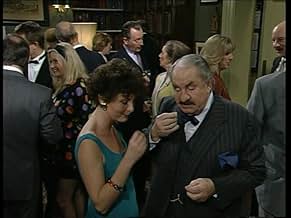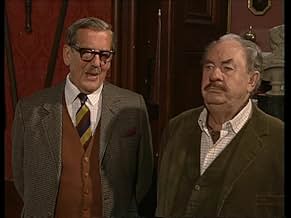VALUTAZIONE IMDb
8,4/10
1891
LA TUA VALUTAZIONE
I casi di un corpulento ed eccentrico avvocato penalista.I casi di un corpulento ed eccentrico avvocato penalista.I casi di un corpulento ed eccentrico avvocato penalista.
- Candidato a 2 Primetime Emmy
- 10 candidature totali
Sfoglia gli episodi
Recensioni in evidenza
It is hard to know who deserves the most credit for this courtroom series; author John Mortimer QC (a noted barrister himself), or actor Leo McKern.
Obviously, the series was written with the benefit of intimate knowledge of the English legal system, but almost every branch of it is portrayed very unflatteringly. Most Barristers are shown as smug and pompous, fencing with each other in Latin phrases while the defendant and jury look baffled; policemen are bent, solicitors are shady and judges are either more concerned with barristers' correct dress rather than the evidence, or sadistic and bigoted.
The seamier side of the profession is also shown; with prestigious barristers having to work from poky "chambers", at the mercy of clerks for their work ("briefs") and undervalued secretaries for their paperwork.
In such a world, a weary and introspective character such as Rumpole dominates the scene. McKern's booming delivery and range of facial expressions make this all too easy. The language is a delight, as Rumpole quotes Browning, Tennyson, Shakespeare at will. Some of the most hilarious scenes occur as lawyers take on their clients' personas and start arguing their cases with each other in the first person, in bars or restaurants.
Rumpole's home life with wife Hilda, "She who must be obeyed", is also shown as quite a caricature, as Hilda Rumpole is portrayed as having few interests beyond her husband's lowly position in the pecking order, and household cleaning agents.
Any one of the episodes makes good viewing.
Obviously, the series was written with the benefit of intimate knowledge of the English legal system, but almost every branch of it is portrayed very unflatteringly. Most Barristers are shown as smug and pompous, fencing with each other in Latin phrases while the defendant and jury look baffled; policemen are bent, solicitors are shady and judges are either more concerned with barristers' correct dress rather than the evidence, or sadistic and bigoted.
The seamier side of the profession is also shown; with prestigious barristers having to work from poky "chambers", at the mercy of clerks for their work ("briefs") and undervalued secretaries for their paperwork.
In such a world, a weary and introspective character such as Rumpole dominates the scene. McKern's booming delivery and range of facial expressions make this all too easy. The language is a delight, as Rumpole quotes Browning, Tennyson, Shakespeare at will. Some of the most hilarious scenes occur as lawyers take on their clients' personas and start arguing their cases with each other in the first person, in bars or restaurants.
Rumpole's home life with wife Hilda, "She who must be obeyed", is also shown as quite a caricature, as Hilda Rumpole is portrayed as having few interests beyond her husband's lowly position in the pecking order, and household cleaning agents.
Any one of the episodes makes good viewing.
I think everyone can identify with the lead character Horace Rumpole. That's because he's a crafty, witty barrister surrounded by a bunch of stuffed shirts and idiots. There's Claude Erskine-Brown, the close confidant of Rumpole's who seems to stumble from one disaster to another; Phylida "Portia" Erskine-Brown, Claude's wife and about a third of his source of problems; Judge Gutherie Featherstone, a rather hapless man who gets caught up in a sex scandal right as he's trying to decide on a case in that matter; junior clark Liz Probert, played wonderfully by Leo's daughter Abigail McKern; the hapless Timson clan, who Rumpole constantly rescues from trouble despite their antics, and most of all, we should not forget "She who must be obeyed" - Hilda Rumpole. The cast was a superb choice and the writing was excellent. What was sad about this series is its ending - it's the kind of thing you don't want to end.
Rarely has television fit a role and an actor together as perfectly as Rumpole and Leo McKern. (A couple of other examples would be Vic Morrow in "Combat!" and Derek Jacobi in "I, Cladius".) The singular pleasure these episodes afford is watching McKern act as the mildly cynical, but resolutely libertarian, barrister. It is easy to see why McKern came to loathe playing the part since it is the ultimate case of typecasting. One can less think of McKern sans Rumpole than he can Connery sans Bond. Better to rewatch Rumpole than the colorless blather on Court TV.
The scripts and additional cast are good enough to make repeated watching of McKern worthwhile.
The scripts and additional cast are good enough to make repeated watching of McKern worthwhile.
Mortimer is such a clever writer and his creation Rumpole is a work of genius,and who better than to pull it all together than Mckern. The author always weaved in 3 stories within an episode, the case,the chambers & home life with She Who Must Be Obeyed.Every episode is worth watching and even some of the weakest bare strong comparison with any other drama. McKern is mesmerising and you cannot take your eyes off him when he is on screen.This is truly great entertainment and the supporting cast are magnificent. This series is probably the greatest of all time as courtroom drama.
Perfection.
Perfection.
Rumpole is an endearing character full of vim and vigor, as they say. despite his casual appearance and his well worn hat, he is a master of the courtroom and a defender of peoples rights to the end.
His little monologues in his mind are both entertaining and educational as he dispenses his thoughts as he walks to the Bailey or as he listens to the prosecutor drone on and on. His dry wit is at times so subtle that I occasionally back up the DVD to listen to his comments again. And I enjoy how most of the other characters don't seem to understand him.
While this show is a lesser known show outside the UK and the legal circles, it is worth sitting down and watching. You may find yourself doing the anti-binge watching as we do - doling out 1 episode at a time because we know there is only a limited number to be watched. We are into season 2 now.
His little monologues in his mind are both entertaining and educational as he dispenses his thoughts as he walks to the Bailey or as he listens to the prosecutor drone on and on. His dry wit is at times so subtle that I occasionally back up the DVD to listen to his comments again. And I enjoy how most of the other characters don't seem to understand him.
While this show is a lesser known show outside the UK and the legal circles, it is worth sitting down and watching. You may find yourself doing the anti-binge watching as we do - doling out 1 episode at a time because we know there is only a limited number to be watched. We are into season 2 now.
Lo sapevi?
- QuizRumpole has a penchant for giving literary or historical nicknames to friends and foes. His wife Hilda's moniker, "She Who Must Be Obeyed," was originally applied to the title character of H. Rider Haggard's novel "She." Phyllida Trant Erskine-Brown's nickname, "Portia," is from William Shakespeare's "The Merchant of Venice." Samuel Ballard is dubbed "Soapy Sam" after Bishop Samuel Wilberforce', who is now best remembered for debating Thomas Huxley over Charles Darwin's theory of evolution, but regarded in his own time as rather a slick operator. He calls Judge Graves the "whited sepulchre", a Biblical allusion (Matthew 27).
- Citazioni
Horace Rumpole: She who must be obeyed!
- ConnessioniFeatured in The 33rd Annual Primetime Emmy Awards (1981)
I più visti
Accedi per valutare e creare un elenco di titoli salvati per ottenere consigli personalizzati
- How many seasons does Rumpole of the Bailey have?Powered by Alexa
Dettagli
Contribuisci a questa pagina
Suggerisci una modifica o aggiungi i contenuti mancanti

Divario superiore
By what name was Rumpole of the Bailey (1978) officially released in India in English?
Rispondi


































